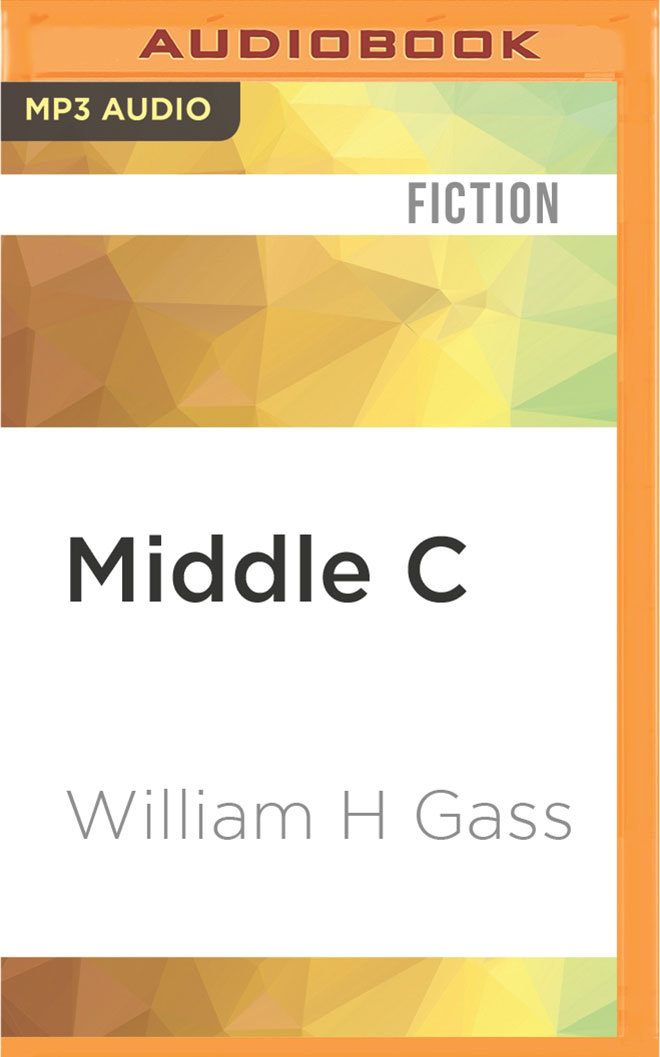What do you think?
Rate this book


MP3 CD
First published March 12, 2013
Once upon a time there was a professor of music whose best instrument was hypocrisy, and who pretended to be concerned about the fate of the human race, when, in fact, he hoped it would vanish from the face of the earth the way a fog dense enough to obscure the landscape slowly diminishes, rising like steam from a damp land, so that the earth could smile again as it must have once, in the days of simple cells, titanic trees, or even reptiles with necks grown long in order to reach the leaves.
Pop buyers preferred singers who couldn’t sing and musicians who couldn’t play because these performers were – as they rose out of sight in their idolaters’ eyes – like pop people themselves, their incompetence was the common touch and made them seem more sincere. Folk music, for instance, had to seem simple, uncouth, and untutored, or it wasn’t folk.
’He wasn’t fleeing from, he was running toward, and what he hoped to learn would be free and unassigned, known only to himself; so that, consequently, to the world Joseph would remain undefined—a vague reference.’Identity becomes a major motif as we watch each progression of linguistic chords play out and flow into another passage of life. Joseph rejects attachments and scorns those with them, such as his distaste for his sisters ‘attachement to something so shallow as school.’ He attempts to conceal his fabricated history, yet is forever haunted by it. Like the modern composers he teaches, he rejects history, wishing to believe, like Miss Spikey says, that ‘History is dead as the nex [sic] chicken I eat’, yet cannot feel the burdens of his past creeping into his present. Are we just a flow of events, our identity formed by the timeline of our actions, as one phrase of music builds out from the former notes? Like the works of Nathaniel Hawthorne, soaked in the guilt of his Puritan roots, do we bear the shame of our forefathers? Joseph is disgusted with the human race as a whole, keeping a collection of news articles documenting the atrocities committed by our fellow man throughout history, and wonders if mankind deserves to exist. ‘He who has lived and thought can never… look on mankind without dis-dain [sic].’ Gass depicts every person as bearing their weight in guilt, guilt of their former transgressions, and the guilt of mankind stemming back from Adam, and shows that we all construct facades of ourselves to hide our filthy souls. No matter how hard Joseph tries to remove himself from the world and all it’s misdeeds, the more he is pulled through the mud and potential scandals. ‘His father had a dream: to keep his hands forever clean. Joey wasn’t clear whether his father had ever understood that it takes a lot of digging in the dirt to do that.’
‘[H]e recognized very early the importance of snobbery as a support for principals…. The snob in motion is hard to head off. But the seventh sense the snob attains is most dearly prized: that of superior taste. And the smug possession of taste is far more infuriating to the wide world (which is, of course, lamentably without it) than any offensive lyrics or annoying noise.’By holding strong convictions (despite not actually believing them) and a head full of esoteric knowledge, nobody would dare challenge his authority. Much like the fascists from which his father fled, a strong adamant authority defies those who would wish to crack it open and expose the weaknesses inside. Although he is a fake, he is superior to those who are authentic, yet Gass questions if anyone is truly an authentic human. While Professor Joseph and his false credentials are entirely an existence made from a lie, so do each and every one of us hide somehow, like Miriam hiding in her Autstrian roots and her garden (itself both a symbol of Eden and fascism), the sister who ‘was concealing herself beneath a blanket of middle-class comfort’ to escape her family shame, the sinners who hide behind their professed religion², or the university staff who are all enter the faculty meeting in fear because ‘[t]hat’s what happens when you carry around a guilty conscience.’ Are we all, as the saying goes, merely players who fret upon a stage? But if so, then what does that make the world?
’But if all the word were a stage, what was backstage, what lurked in the wings, and where were the actors and the actresses when they weren’t on, and why did everybody talk all at once, and the people playing at war shout their lines while the people playing at peace were trying to read theirs, and why were only some shows sold out to an audience more often than not anxiously fanning their faces and drinking booze, because wouldn’t they be participants, too? And would there be music coming from the pit? Backstage, to be sure, was a deity devising the lines, and a whole host of angels, devils perhaps, imps and fairies, raing curtains and dressing persons, contriving designs and prompting the forgetful. Every performance would have to be a play about a play within a play. It was a daze-inducing thought.’Gass seems right at home in every page of the novel, pulling his full range of experiences together to create this quiet, yet irresistible story. In an extraordinary chapter, in which Joseph beings conducting his sentence which, in its infancy reads ‘The fear that the human race might not survive has been replaced by the fear that it will endure’, calls to mind Gass’ essays on sentence structure and language as he examines what even the tiniest alterations of words imply in their connotations and configurations. Having spend many years teaching at Universities, Gass seems to be reliving his days behind the podium through his text, flourishing it with fascinating historical facts and prompting the reader to participate and do their homework. Neatly embedded in the text and lecture scenes are unanswered questions posed to the student and numerous allusions of which he draws the reader’s attention to as if begging them to raise their hands and explain. The novel is overflowing with disdain for faculty meetings, University politics, and fellow professors that makes one wonder how much is Skizzen and how much is Gass. In fact, much of the Professor section of the novel was inspired by an event is Gass’ own history, reproduced here as told to Greg Gerke by Gass in Volume 14, Number 2 of Tin House Magazine.
’The new book, though, is based more on an actual event. When I first started to earn my living in the world, I was teaching at a college called Wooster, in Ohio. And there arrived on the campus one day an Englishman who taught history. The officials had hired him. He was charming, and had huge audiences for his classed. He’d been there about two or three months when the authorities came around and said, “This guy is a fake, a bigamist, and his name is Peters, and he’s wanted by the English and Canadian police.” And everybody was shocked, because everybody had made him over as such a brilliant man and so forth. That was all that actually happened, but I thought, Well, I want to talk about—or deal with—somebody who’s a counterfit of that sort…As a fraud, he’s better than most genuine people.’While the novel isn’t perfect—but what novel truly is? —it is a fantastic achievement and a celebration of the versatility and musicality of language as well as it’s long history and progression beyond modernism. Like the composers who reject the tradition to forge a new path, they have grown out of the past. While Gass’ novel has all the postmodern flourishes, it’s long, life-story narrative and separation into numbered chapters seem to invoke a subtle nostalgia for the modernism from which it has progressed. Gass takes a morbid and critical eye at humanity, reminding us that we are born to die, and forcing us to take a good hard look at the world we exist in. Should we bear the shame of our race? Should we accept the atrocities? It is shown that we, as individuals, are but notes on the staff of humanity, and all harmonize together to sing the song of our species. As traditions of music attempted to upset and overthrow one another, we as people do the same, creating a violent cacaphony in our world.Middle C is a phenomenal novel that quietly pushes forward through passages of poetic brilliance that make it nearly impossible to set down.

...he would like to have looked out on it a little like God on the first day and observed the mess we had made of ourselves, and seen spread out over infinity a single placid sea of shit. He would have liked to be there at the end to find accounts rendered and justice done.Given a choice of passing a single verdict on entire human race and humanity based either upon the right choice of words or right choice of music, what would you possibly choose? Professor Skizzen might convince you that such judgment will gain an immortal identity once its formation is done with a judicious mix of both but before that, it has to go through many phases to achieve a supposed perfection.









Joey was innocent. He had not stolen the diamond-pointed needle from Mr. Kazan's store. He had not given Professor Ludens the least encouragement. He had not had evil intentions when he accepted Madame Mieux's invitation, or succumbed in any way to intoxicating smoke in Mieux's nest of cozy pillows. He had not made sinful overtures to the Major or taken advantage of Portho's poverty. He had not conspired to defame or overthrow the Lutheran church whatever Rector Gunter Luthardt might say. He had returned all his borrowed books to the library. He had persuaded the college to feed the school's emaciated collection of recordings until it was plump, if not fat.
Now cast your eyes upon the palette that modern circumstances have placed before the composer, all pertaining to the nature of any singled-out sound or insect's whir. There is the instrument that is its source, as the cricket's is of its, and any messages that may be traced to it, for instance, the call of a bullfrog or the whistle given girls; there is the placement of the instrument in the pit, on the platform of the concert hall, or for solo or ensemble performance in a historic chamber; there is the choice of size and shape the musician must give his note (fat or thin, loud or soft, crisp or slurred) and the qualities of sound that can be expected from each of a hundred sorts of instrument; moreover, to be accounted for, there are the relations this note has with other notes (those that precede, those that follow, those that suffer or enjoy polychords, clusters, skeins, runs, motifs, themes, as well as all the other groups of notes that are treated as an entity—clouds of notes, cascades, fistfuls, snivels of notes—and all those with whom it shares rhythmic relations; repeated notes, notes that have been given a dominant position, those who satisfy subordinate roles, compositions in keys and styles and size, that have historical associations, reflect common customs, or reveal well-known intentions. Cast eyes and cry: too many and too much; take away this hive of opportunity, this surfeit of choice, and let us retire to simpler times when such a plethora was not recognized, our eardrums were not African, and our serious intentions were pious.Later last night I read Rick Moody's essay on Brian Eno (in the anthology Cooking And Stealing though it also appears in the first issue of Tin House) and read that Eno once said that 90s electronica "needed more Africa" a critique which can be applied to nearly anything. While The Middle C could certainly be more polyrhythmatic, I'd say that it achieves a sufficient balance between unity and variation.